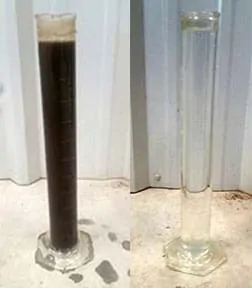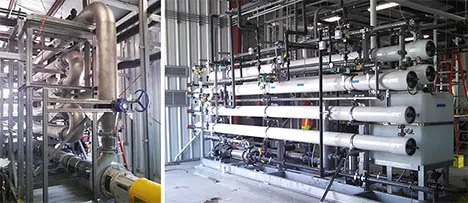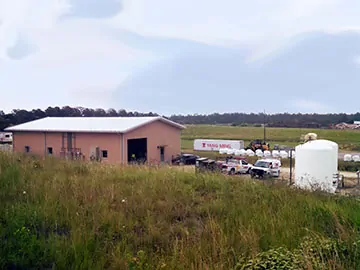


Do you really need to use a drinking straw? With most beverages, probably not! Make this one change and help America reduce the amount of plastic going into our landfills.
Click to learn more about Sustainable Materials Management.
The initiative to optimize the residential waste and recycling collection system for current and future operations exemplifies the County’s commitment to safe, efficient, and excellent civic services for residents.
The County of Sacramento, Department of Waste Management & Recycling (DWMR) is contracting with SCS Engineers to study and analyze how to optimize the routing, collection, and disposal of municipal solid waste, green waste, organics, and single-stream recycling in the unincorporated area of the county. The analyses will help Sacramento control costs, provide quality services to residents, and lower their carbon footprint.
Using a three-cart system, the DWMR provides weekly residential garbage collection, every other week recycling, green waste collection, and other waste collection services to approximately 155,000 residents in unincorporated Sacramento County.
Currently, vehicles cover 71 routes and collect a total of 151,000 tons of municipal solid waste, 77,000 tons of green waste and organics, and nearly 37, 000 tons of single-stream recycling annually. Materials go to appropriate locations, including the county-owned and operated North Area Recovery Station and the Waste Management owned and operated Sacramento Recycling Center and Transfer Station.
Approximately 60 percent of residential collection activity occurs in the northern half of unincorporated Sacramento County and 40 percent in the southern half. DWMR will use SCS Engineers’ comprehensive analyses and the current residential waste collection and disposal operations to identify options for charting a path forward that will optimize collection efficiencies and reduce collection costs. The analyses examine these areas, as follows:
Regulatory compliance, including comprehensive, cost-effective adherence to all applicable known and anticipated regulations and ordinances
Financial and contractual controls, such as long-term agreements with haulers, processors, contractors, key suppliers, and vendors; infrastructure maintenance and construction
Route logistics and vehicle controls, for example, the number of routes, type of vehicles, safety, carbon footprint reductions, workloads
Community satisfaction with clear communications, ease of disposal, overall convenience, and other factors to continuously improve residential service
The SCS analyses include a model for creating alternative collection scenarios for waste and recycling operations and performing cost modeling. The model gives the County the benefit of insight into many potential options while considering various technology, best practices of the operations staff and fleet crews, and rate structures. The SCS model is in use in cities and counties across the U.S.
“The data and the way it is analyzed and interpreted will lay the foundation for collecting waste and recycling in the unincorporated area of the County,” stated Tracie Bills of SCS Engineers. “The cost savings and environmental benefits are significant supporting Sacramento residents into the future.”
SCS Engineers met a tight, non-negotiable regulatory deadline to get the new plant on-line while meeting non-toxic effluent standards.

Everyone enjoys before and after pictures; just look at the results New Hanover County’s program is producing. This and other County programs are helping this North Carolina county reduce reliance on landfill disposal while creating a comprehensive and sustainable solid waste management system that is protective of the environment.
In 2016 a new wastewater treatment plant was commissioned at the New Hanover County Landfill. The new facility processes approximately 65,000 gallons per day (GPD) of leachate using state-of-the-art ultrafiltration (UF) and reverse osmosis (RO) technologies to meet or exceed federal and state treatment standards.
The raw leachate is pre-treated in an existing aerobic lagoon followed by a sequencing batch reactor (SBR) to reduce organic constituents. The pretreated effluent then flows into the membrane system. Using state-of-the-art membrane filtration technology, including ultrafiltration (UF) pictured at lower left, and a reverse osmosis (RO) system, pictured lower right, to produce crystal clear, effluent discharged to an upper tributary of the Cape Fear River.

The new facility can process 75,000 GPD and the Wastewater treated through the new system meets state Drinking Water standards for quality.
Tough surface water discharge standards and predictable performance in cold weather drove the design to use UF/RO systems. The results are impressive; metals including arsenic are BDL, ammonia <0.2 ppm, and TSS < 2 ppm. The system produces approximately 13,000 GPD of RO concentrate that is pumped to the working face and safely disposed of in the landfill. The County has certified operators that have played a big role in getting the plant shaken down and running smoothly.

“New Hanover County is an industry leader in adopting proven technologies to better manage solid waste, and protect the environment. This kind of planning and approach can benefit many other public works departments,” stated Bruce Clark, PE, BCES, LEED AP®, and SCS Engineers National Expert on Waste Conversion.
As Joe Suleyman, the County’s Environmental Management Director put it, “Let’s face it – people move to New Hanover County because they love to be in, on, or near the water. Our technical staff is composed of very talented folks who have environmental science and biology backgrounds. They believe in what they’re doing to help protect our delicate coastal environment, and this state-of-the-art system is a huge stride towards meeting our own expectations and those of the citizens we serve.”
See more case studies, services, and professionals on the SCS Engineers – Liquids Management Website
We hope you find this Waste360 article helpful.
http://www.waste360.com/fleets-technology/what-s-next-route-optimization
Other related articles of interest include financing and rate studies see Solid Waste Management Services at SCS Engineers.
Rogoff will be leading a panel at this year’s WasteExpo in New Orleans. The session on Route Optimization Management will take place on Monday 8 at 9:00 AM. See more presentations and topics at Waste Expo 2017.